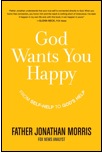It’s true. You never do anything for no reason.
So, whether you’re coaching yourself or someone else, it’s helpful to dig to discover what actually motivated apparently incomprehensible behavior. Four basic motivations are often at the root of such actions. I call them the formidable four.
Looking good.
Feeling good.
Being right.
Being in control.
We’ll examine the second one today.
Have you noticed society’s growing intolerance of anything difficult, painful, challenging, or distressing?


 The desire to feel good and to avoid feeling bad are enormously influential in American culture and, sadly, in the Church today. It influences contemporary theology.
The desire to feel good and to avoid feeling bad are enormously influential in American culture and, sadly, in the Church today. It influences contemporary theology.
The ridiculous notion that ‘God’s great aim is to make you happy’ has helped undermine our stamina as people of faith. When distress occurs, we no longer interpret it as a normal feature of faithfully following Christ [Act 14:22, Phil 1:29, I Pt 2:21]. Rather, we consider it evidence that something’s gone wrong. Gravely wrong.
Consequently, we prioritize the deliverance from suffering over the development of our souls.
The result? An anemic witness and a society gone awry.
Feeling good quiets pastors when it’s time to forcefully confront a sinning member—particularly when she wields enormous power or money.
Feeling good keeps denominational leaders moving incompetent ministers from parish to parish—instead of directly challenging his dysfunction.
Feeling good invites elders to ignore a series of relatively mild, but troubling, ethical breaches—because to take decisive action might be misinterpreted.
Feeling good confines a senior pastor to the seclusion of her study rather than mix it up with church members who are unhappy or unpredictable.
Feeling good beckons Christians to ignore the impact of their self-centeredness on those God’s called them to influence.
 Our Enemy, knowing this vulnerability, loves to pile on. When I’m facing opposition in one area of ministry, trouble will often beset another. Before long, the wheels have come off in a third area of life, then a fourth and a fifth. As the challenges mount, determination can evaporate into discouragement and morph into despondency.
Our Enemy, knowing this vulnerability, loves to pile on. When I’m facing opposition in one area of ministry, trouble will often beset another. Before long, the wheels have come off in a third area of life, then a fourth and a fifth. As the challenges mount, determination can evaporate into discouragement and morph into despondency.
To shield myself from additional difficulty, I can begin to withdraw from life.
My life.
This creates a vacuum. When I am absent from my own life, mayhem takes over. Since I’m not present, those who are accustomed to my participation try to make sense of my absence. Since they don’t see me, they make stuff up. And the rumors start. In time, the congregation’s confidence in the pastor’s leadership is so eroded that there’s no coming back.
When you catch yourself withdrawing from your life or ministry, my invitation is to trust God and leap back into the middle of your life.
Amazingly, you’ll usually find God there waiting for you.
Coaching Distinctions # 7
Thanks Kirk… good reminder today